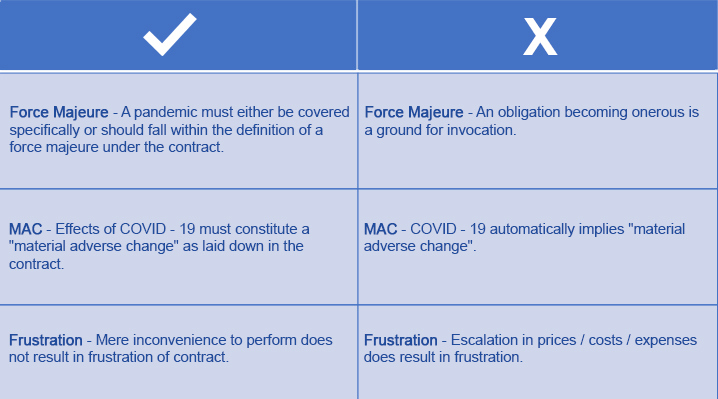
Emergence of Novel Corona Virus (Covid-19) is having an unprecedented impact on the human race, businesses and nations, physically, psychologically and economically, all over the globe. It is also impacting corporate/commercial sector to a great deal as it is tearing apart economic stability of companies/businesses.
The major influence of COVID-19 on business is that it is hindering ability of companies/businesses to perform their contractual obligations within stipulated time due to prevalence of certain uncontrollable circumstances which businesses have never witnessed/experienced in the past. As a consequence, Force Majeure (FM) clause has hugged limelight like never before as it has become a highly debated and discussed concept in the area of Contracts. Companies/businesses are thoroughly reviewing/ assessing FM clauses in their contracts to seek exemption from contractual performance.
Genesis
1. The expression “force majeure” is not a mere French version derived from the Latin term “vis major” meaning ‘superior force’; instead, it refers to a scenario and / or situation which obstructs the performance of obligation under a contract.
2. The term “force majeure” does not find a mention under any Indian Statute.
3. Generally, a “force majeure” event includes war, natural disaster, act of God, pandemic and/or epidemic etc. meaning incidents or events over which the parties have no control.
INTENT OF FORCE MAJEURE CLAUSE
The parties to the contract would be protected from any liability, whatsoever for their failure to perform obligations enshrined in the terms of the contract.
Allows the parties to either suspend or terminate the performance of contract. For example:
1. Suppliers unable to supply goods or services, clients unable to discharge payment obligations, logistics unable to complete delivery obligations, tenants or lessees unable to pay rent etc.
2. There must be an implied or express Force Majeure clause in the contract.
3. Express notice of invocation is required to be given.
4. Burden of proof lies on the party who intends to invoke the clause, in other words it is incumbent upon a party to establish that it is unable to perform the contractual obligation.
FRUSTRATION OF CONTRACT
1. In absence of force majeure, recourse to the doctrine of frustration is available to the parties, as Indian Contract Act, 1872 per se envisages the provision under Section 56.
2. Can be resorted to when a contract is frustrated on account of supervening impossibility.
3. Not mere physical or literal impossibility but the occurrence of an event which renders performance of contract impractical or useless from the objective viewpoint of the contract.
4. The impossibility should be due to reasons of some event which the promisor could not prevent.
MATERIAL ADVERSE CHANGE
1. Popularly known as MAC clause.
2. Used mostly in Loan Agreements and Mergers & Amalgamations.
3. Contracting parties have the ability to agree on what constitutes a Material Adverse Change.
4. Such clause typically allows an acquirer / financier to terminate the transaction after the signing of the Agreement but before closing of the transaction.
5. However, in order to save a deal, parties may be able to amend the contract and re-negotiate price adjustments, deferred closing, or even deferred consideration construction.
FLIP FLOP: Force Majeure, MAC & Frustration

FORCE MAJEURE JURISPRUDENCE: Views of The Supreme Court of India
The entire jurisprudence on the subject has recently been stated by Hon’ble Justice R F Nariman of the Supreme Court in the matter of Energy Watchdog vs Central Electricity Regulatory Commission & others.
The key takeaways of the judgement:
1. Indian law does not permit the parties to be discharged, irrespective of the construction of the force majeure clause in question, since the change in circumstance did not ultimately prevent the parties from performing their obligations.
2. A contract is not frustrated merely because the circumstances in which it was made are altered.
3. Applying the doctrine of frustration must always have narrow limits.
4. A more onerous method of performance per se would not amount to frustrating event.
RECENT VIEWS OF THE DELHI HIGH COURT
Recently on 20.04.2020, the Honourable High Court of Delhi in the matter of M/s Halliburton Offshore Inc. vs Vedanta Limited and another, granted ad-interim injunction from invocation of performance bank guarantee by the respondents where the petitioner pleaded inability to complete the project due to lockdown resulting from COVID – 19. The Court held that:
1. The Nationwide lockdown was, in its opinion, prima facie in the nature of force majeure.
2. Such lockdown is unprecedented and incapable of having been predicted by the parties.
3. The Hon’ble Court took a prima facie view that “special equities” do exist, as would justify grant of injunction till the expiry of a period of one week from 03.05.2020 (till lockdown).
SUGGESTIVE SAFEGUARD
In the light of this current PANDEMIC, few safeguards are to be observed in commercial engagements:
1. Re-assess and review the contract in which the force majeure clause exist and analyse the relevant factor and incidents mentioned to initiate the “rule to excuse”.
2. Ensure issuance of requisite “Notice” to respective parties citing events and specific clauses in the Agreement leading to force majeure, frustration or MAC, as the case may be.
3. Analyse mutually (along with the other parties to contract) the impact of the outbreak of COVID – 19 on the contract and its performance.
4. Initiate a change to perform the contract in possible alternative way, failing which may rule out a future defence with respect to an alternative method of performance.
5. Collect evidence to accord non-performance of the obligation to the sole force majeure event, in the current scenario, the pandemic.
6. Keep a record of various notifications and orders passed by the Central / State Government and Administrative Bodies. The same may be evidenced during the litigation / arbitration proceedings.
7. Maintain all records w r t unavoidable additional expenditure incurred.
8. Implement new process for execution of contract digitally in accordance with the provisions of the Information Technology Act, 2000.


Market insight and its effect on Aluminium and Cement Industry Facts: 1. India is the world’s biggest consumer of pet ...
Read More
Can You Break A Cartel? A cartel is a group of suppliers which together attempts to control production, marketing, and p...
Read More
Hospitality sector banks on food to bounce back from September Building of trust among the customers will be the key for...
Read More